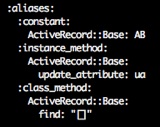 François Vaux has recently published a Ruby module called Rackable which allows you to make any Ruby object Rack-friendly, providing it with a REST-like interface.
François Vaux has recently published a Ruby module called Rackable which allows you to make any Ruby object Rack-friendly, providing it with a REST-like interface.
What does this mean? Well, a Rack application is essentially a Ruby object that responds to call(). Rackable just gives your object a call method which uses the Rack environment to dispatch to a method.
So, you just need to include Rackable in your class and implement methods for the the appropriate REST verbs. This means you can create a hello_world.ru file like this:
require ‘rackable’
class HelloWorld
include Rackable
def get()
“Hello, world!”
end
end
run HelloWorld.new

 Until recently, I had been using the
Until recently, I had been using the 
 A couple of weeks ago we featured
A couple of weeks ago we featured  Inspired by
Inspired by 
 When running a Ruby daemon which executes code in a loop, if the process is killed while something is happening then problems can occur if the code doesn’t handle all the exceptions properly or if the loop isn’t broken cleanly.
When running a Ruby daemon which executes code in a loop, if the process is killed while something is happening then problems can occur if the code doesn’t handle all the exceptions properly or if the loop isn’t broken cleanly. 

